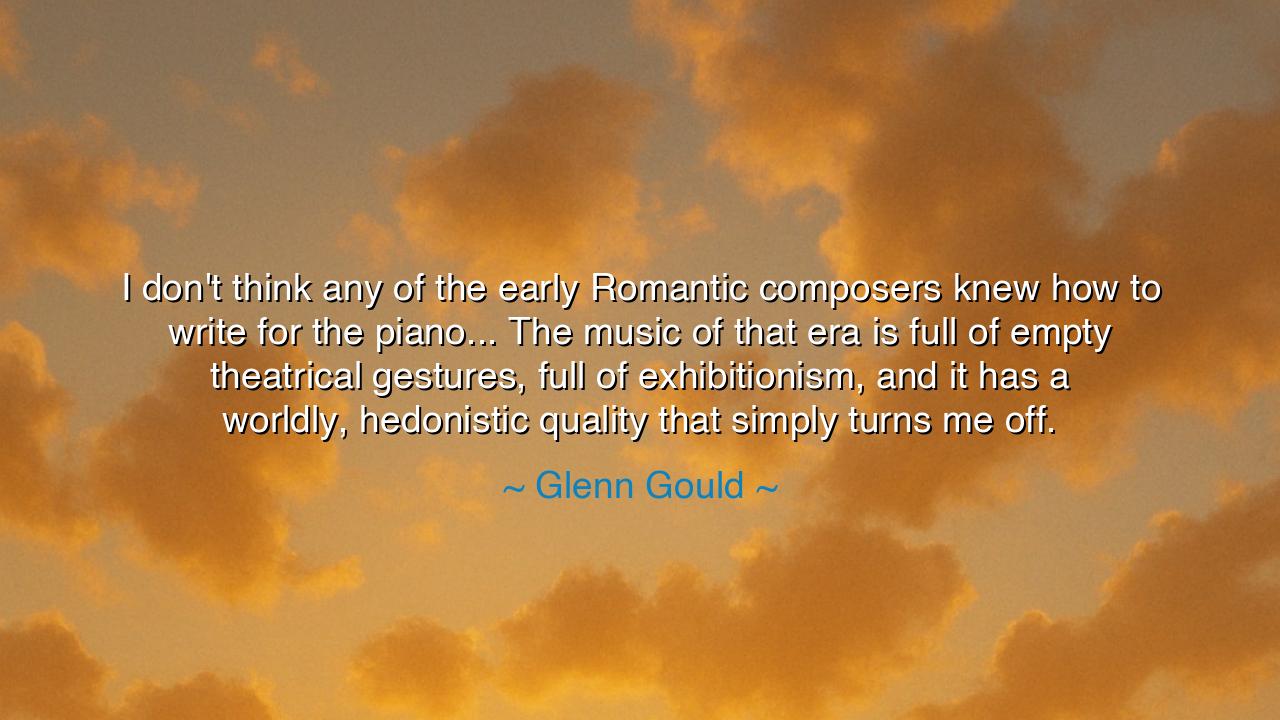
I don't think any of the early Romantic composers knew how to
I don't think any of the early Romantic composers knew how to write for the piano... The music of that era is full of empty theatrical gestures, full of exhibitionism, and it has a worldly, hedonistic quality that simply turns me off.






Listen closely, my children, for the words of Glenn Gould offer a deep reflection on the nature of music, its evolution, and the role of the composer. He said, "I don't think any of the early Romantic composers knew how to write for the piano... The music of that era is full of empty theatrical gestures, full of exhibitionism, and it has a worldly, hedonistic quality that simply turns me off." In these words, Gould speaks not only of his personal opinion of the Romantic period but of a deeper criticism of how music was evolving—a music that, in his eyes, was more concerned with appearance than with substance. He was not merely criticizing the composers themselves, but pointing to a broader truth about the dangers of excess and superficiality in art.
In the ancient world, music was not simply about the outward expression of emotions but was a sacred language that connected the human soul to the divine. The Greeks, for example, saw music as a force that had the power to shape the very fabric of the universe. Pythagoras, that great philosopher and mathematician, believed that music was governed by mathematical ratios and that the harmony of the cosmos could be understood through the study of music. In this world, music was something pure, something that transcended personal ego. Gould's words, in this sense, are a call to return to the essence of music—away from the theatricality and exhibitionism that he felt pervaded the Romantic era, and back to something more authentic and spiritual.
The Romantic era, with composers like Chopin, Liszt, and Schumann, did indeed shift the focus of music toward emotion and individual expression. This period, rich with dramatic gestures and virtuosity, was also deeply influenced by the growing importance of the individual in society. The piano, which had previously been a more utilitarian instrument, became the vehicle for self-expression, and composers began to write in a way that pushed the boundaries of technique, making music that could display the performer's technical prowess as much as it conveyed emotional depth. But in the eyes of Gould, this shift represented a move away from the purity of music as a means to touch the soul, and instead, a turn toward a worldly, hedonistic pursuit of fame and personal glory.
Consider the tale of Ludwig van Beethoven, a composer of the Classical era whose works transcended his time. In his Piano Sonata No. 29 in B-flat major, Op. 106 (commonly known as the "Hammerklavier"), Beethoven pushed the limits of what was possible on the piano, but he did so not for showmanship or exhibition, but in service of a greater artistic vision. His music was a symphony of the soul, an expression of the struggle of the human spirit. Beethoven's focus was not on the theatrical gestures of the Romantic composers, but on creating something that would last—music that would continue to speak to the hearts of listeners long after his time. Gould’s criticism of the Romantic era, then, is not a rejection of all of its contributions, but a recognition that the desire for self-glory in music sometimes distracted from the true purpose of art: to connect and to elevate the spirit.
It is in this light that Gould's remarks should be understood. He was not simply attacking the composers of the Romantic era, but pointing to the overindulgence that marked much of their work. The exhibitionism of the virtuoso, the dramatic flourishes and grand gestures, took attention away from the essence of the music itself. He longed for something more pure, something less concerned with outward performance and more concerned with the inner meaning of the music—the soul of the composer and the connection to the listener. He felt that the piano, as an instrument, deserved more than just flashy technique; it should serve as a vessel for deep expression, not just public display.
Consider the sages of the past, such as Confucius, who spoke often of the importance of inner virtue and of humility. The true artist, he believed, was one who understood that beauty came not from seeking attention but from serving a higher truth. In much the same way, Gould saw music as a path to something greater than individual fame—a way to reach beyond the ego and touch something universal, timeless, and meaningful. Music, in his view, should not be about performance for its own sake but should instead serve to reflect the depth of human experience and the search for inner truth.
And so, my children, what lesson can we draw from Gould's words? It is this: True artistry, whether in music, in life, or in love, comes not from the desire to be seen, but from the pursuit of something deeper. The Romantic composers were brilliant in their own right, but they often sought to impress, to move not the soul but the senses. In contrast, the greatest works of art—whether Beethoven's symphonies or Gould’s own interpretations—are those that speak to us not through empty gestures but through the profound truths they reveal about our human condition. Let us strive, then, to create and to live with humility, seeking not the applause of the world, but the quiet connection to the deeper rhythms of existence.






AAdministratorAdministrator
Welcome, honored guests. Please leave a comment, we will respond soon